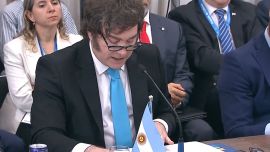Economy Minister Martín Guzmán has reiterated to Argentina’s creditors that the country cannot pay more than it has already outlined in its debt restructuring offer, just days ahead of the proposal’s expiration.
In an exclusive column for Britain’s Financial Times newspaper, Guzmán laid out the challenges facing Argentina’s struggling economy and told bondholders blunty that “the time for illusions is over.”
“Even before the pandemic, the people of Argentina were suffering in an economy marked by recession, high unemployment, rampant inflation and dramatic poverty. Now, Covid-19 has devastated exports and fiscal revenues too,” the minister wrote.
Guzmán said negotiations over Argentina’s US$65 debt swap deal were taking place during a time at which the coronavirus pandemic had “forced the adoption of emergency measures aimed at sustaining a minimum livelihood for the unemployed, and to avert a total economic collapse.”
The minister asked bondholders for “common sense, collaboration and fresh ideas” and said that Argentina “cannot continue to spend 20 percent of government revenues or more on debt payments.”
“Bondholders have a choice,” he wrote. “Recognise the historic challenges and seek new ways forward, or stubbornly insist on short-sighted repayment terms that appear to provide quick returns but only degrade debtor countries and undermine their ability to repay.”
He added that “it is in creditors’ best interests to avoid the destructive patterns of the past of impossible promises and repeated crises.”
“Let’s be clear: this isn’t a game of spreadsheets. At stake is the economic fate of 45 million Argentine citizens. More than 35 percent of our population and 52 per cent of children are already in poverty.
“No democratic government can impose still more hardship or be asked to put bondholders ahead of economic policies designed to palliate the catastrophic effects of the pandemic,” he argues.
‘Good faith’
Argentina’s formal offer to private bondholders was delivered on April 17, but it met with a cold reception from at least three investors groups, who have said they will reject the deal. The deadline the offer expires this coming Friday (May 8), and most analysts predict it will be rebuffed.
The Alberto Fernández administration’s proposal covers over US$65 billion in bonds issued under foreign law. It contemplates a three-year grace period along with a 62 percent haircut on interest payments (US$37.9 billion) and 5.4 percent on capital (US$3.6 billion).
The bonds were issued between 2016 and 2018 by the Mauricio Macri government but some also stem from the previous debt restructuring in 2005 and 2010 under the Néstor Kirchner and Cristina Fernández de Kirchner presidencies. Under the proposal, they would be exchanged for new bonds falling due between 2030 and 2047.
Guzmán’s article in the influential financial daily said that Argentina is negotiating in “good faith” and had an “unwavering commitment” to “bring honest with both ourselves and our creditors.”
Linking the crisis to other “struggling debtor nations,” the minister said the offer for the table would allow “breathing space” to permit Argentina’s economy to recover.
“We are, in short, not asking our creditors to lose — but to make less. Forcing further austerity to pay more would not only be economically disastrous, but also politically and morally unacceptable — and ultimately unsustainable,” said Guzmán.
“I must be explicit and clear: we cannot afford to pay more,” he concludes.
* The full column (in English) can be read here: https://www.ft.com/content/9199723e-8c79-11ea-af59-5283fc4c0cb0






















Comments